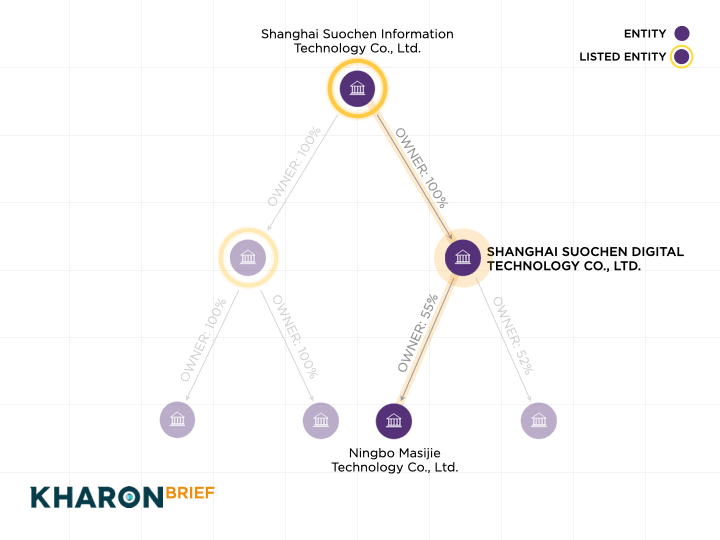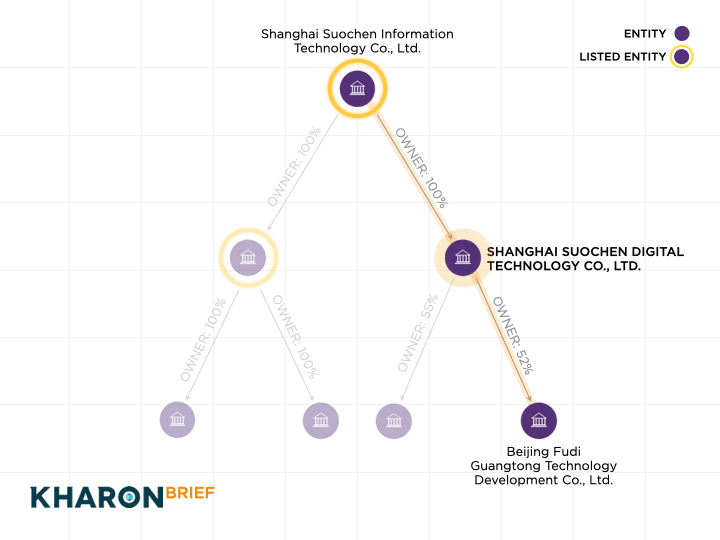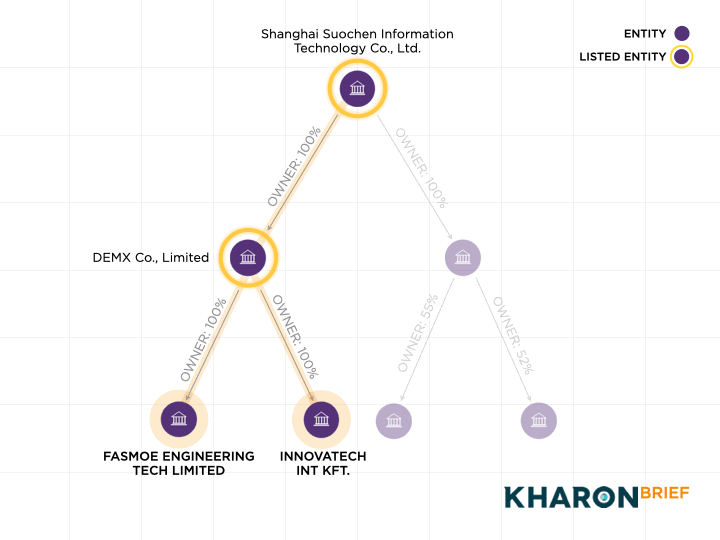The arrival of the U.S. Bureau of Industry and Security’s (BIS) 50% “Affiliates” rule means that exporters will have to screen potential customers for upstream ownership with more depth than ever. In practice, that process won’t always be straightforward: Blacklisted owners often aren’t just one step up the corporate chain.
Consider the broad network of China’s Shanghai Suochen Information Technology Co., Ltd., a publicly traded company that deals in computer-aided engineering software. BIS added Shanghai Suochen and a direct subsidiary to the Entity List last month for developing such software “for key customers in the Chinese military-industrial complex.”
But a Kharon investigation identified several nonlisted second-tier subsidiaries that have done business for years with key military end-users themselves, including with the People’s Liberation Army. Under the new 50% rule, trade with such subsidiaries would automatically be subject to the same restrictions as with their parent, even though these companies aren’t named on the Entity List.
An added dimension here: A few more Shanghai Suochen subsidiaries are based in the West.
That means that Entity Listed Shanghai Suochen ultimately holds a majority stake:
Consider the broad network of China’s Shanghai Suochen Information Technology Co., Ltd., a publicly traded company that deals in computer-aided engineering software. BIS added Shanghai Suochen and a direct subsidiary to the Entity List last month for developing such software “for key customers in the Chinese military-industrial complex.”
But a Kharon investigation identified several nonlisted second-tier subsidiaries that have done business for years with key military end-users themselves, including with the People’s Liberation Army. Under the new 50% rule, trade with such subsidiaries would automatically be subject to the same restrictions as with their parent, even though these companies aren’t named on the Entity List.
An added dimension here: A few more Shanghai Suochen subsidiaries are based in the West.
Chinese subsidiaries
The company: Ningbo Masijie Technology Co., Ltd., a Chinese software developer and manufacturer of electronic information equipment, is 55%-owned through a wholly owned subsidiary of Shanghai Suochen.That means that Entity Listed Shanghai Suochen ultimately holds a majority stake:

- Keep in mind: U.S.-flagged parent companies are often buried beneath layers of obscure ownership structures that make them more difficult to detect. Such opaque ties rarely surface in a single registry or record, requiring cross-source analysis to uncover exposure risk.
- Both were added to the Entity List, in 2020 and 2021, respectively, for supporting “China’s military modernization” efforts.
- In August 2020, it bid for a contract to supply an “integrated control hardware system” to the PLA’s Naval Aviation University.
- In August 2024, it bid to supply the PLA with a “damage control module,” likely for a naval vessel.
The company: The same direct parent of Ningbo Masijie also has a 52% stake in Beijing Fudi Guangtong Technology Development Co., Ltd.
That once again puts Shanghai Suochen’s ultimate ownership share over the new BIS threshold:

The trade: Beijing Fudi Guangtong Technology is mainly engaged in “the research, development, and application of simulation technology,” according to Shanghai Suochen’s 2025 annual report. That’s a field with a number of military applications.
Procurement records show that Beijing Fudi Guangtong Technology supplied the PLA with training equipment in 2022. It has also supplied:
In practice: Under the old “legally distinct” standard in BIS regulations, subsidiaries and affiliates often fell outside the scope of U.S. export restrictions, even when their activities raised potential diversion concerns.
But the arrival of the 50% rule changes that dynamic. Now subsidiaries, like Ningbo Masijie and Beijing Fudi Guangtong Technology are presumed subject to the same strict trade restrictions as their BIS-listed ultimate parent automatically. U.S. exporters would need to seek a license before engaging.
The companies: The direct subsidiary that BIS listed alongside Shanghai Suochen last month, DEMX Co., Limited, in turn owns two subsidiaries, Fasmoe Engineering Tech Limited and Innovatech INT Kft, that are based in the U.K. and Hungary, respectively.
Procurement records show that Beijing Fudi Guangtong Technology supplied the PLA with training equipment in 2022. It has also supplied:
- Jiangnan Shipyard (Group) Co., Ltd., which holds military licenses and which Chinese media in 2019 categorized as a military factory;
- the Beijing Institute of Machinery and Equipment, which BIS added to the Entity List in 2018, citing an “unacceptable risk of use in (or diversion of U.S.-origin items to) military end-use activities in China”;
- and a unit of the PLA Air Force Command Academy.
In practice: Under the old “legally distinct” standard in BIS regulations, subsidiaries and affiliates often fell outside the scope of U.S. export restrictions, even when their activities raised potential diversion concerns.
But the arrival of the 50% rule changes that dynamic. Now subsidiaries, like Ningbo Masijie and Beijing Fudi Guangtong Technology are presumed subject to the same strict trade restrictions as their BIS-listed ultimate parent automatically. U.S. exporters would need to seek a license before engaging.
European subsidiaries
Meanwhile, another branch of this PLA-tied corporate network extends into the West.The companies: The direct subsidiary that BIS listed alongside Shanghai Suochen last month, DEMX Co., Limited, in turn owns two subsidiaries, Fasmoe Engineering Tech Limited and Innovatech INT Kft, that are based in the U.K. and Hungary, respectively.

According to Shanghai Suochen’s 2025 annual report, both these subsidiaries are engaged in technology development services. The U.K. Companies House describes Fasmoe Engineering’s “Nature of business” as “Business and domestic software development”; the Hungarian Company Information Service describes Innovatech’s main activity as “Computer Programming.”
In practice: Though these subsidiaries are based in Europe and are absent from any government list, they would now fall within the same sweep of U.S. export controls under the new BIS 50% rule.
More from the Kharon Brief:
In practice: Though these subsidiaries are based in Europe and are absent from any government list, they would now fall within the same sweep of U.S. export controls under the new BIS 50% rule.
In brief
Shanghai Suochen’s subsidiaries illustrate the exact sorts of risk profiles that the new BIS 50% ownership rule is designed to combat—and that U.S. exporters, more than ever, will proactively need to address.More from the Kharon Brief:







